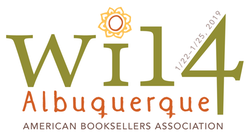 At the American Booksellers Association's Town Hall meeting last week during Winter Institute 14 in Albuquerque, N.Mex., topics of discussion included an update from the ABA's Diversity Committee (formerly Diversity Task Force), the shortage of key titles last holiday season, minimum wage and more.
At the American Booksellers Association's Town Hall meeting last week during Winter Institute 14 in Albuquerque, N.Mex., topics of discussion included an update from the ABA's Diversity Committee (formerly Diversity Task Force), the shortage of key titles last holiday season, minimum wage and more.
Diversity Committee
Board president Robert Sindelar of Third Place Books in Lake Forest Park, Ravenna and Seward Park, Wash., opened the Town Hall meeting with the announcement that the ABA's Diversity Task Force, created two years ago after the Town Hall meeting at Winter Institute 12, would be renamed the Diversity Committee and become a "permanent part of our organization." Members of the Diversity Committee, meanwhile, gave several progress updates on their initiatives.

|
|
| ABA Board members at Town Hall | |
Hannah Oliver Depp of Loyalty Bookstore (formerly Upshur Street Books) in Washington, D.C., reported that a mentorship program is in development, with ABA board member and Duende District Bookstore owner Angela Maria Spring leading. Lane Jacobson, owner of Paulina Springs Books in Sisters, Ore., said the committee is working with Edelweiss to create a handful of filters pertaining to diversity to make it easier for booksellers to find diverse titles in catalogues. Denise Chávez, owner of Casa Camino Real Bookstore, Las Cruces, N.Mex., gave an update on the Refugee Book Drive. BrocheAroe Fabian, owner of River Dog Book Co. in Beaver Dam, Wis., encouraged booksellers to join the ABA Diversity Committee Facebook page, and Veronica Liu of Word Up Community Book Shop in New York City discussed the committee's efforts to find ways to help more diverse stores "join the fold."
Holiday Stock Shortages
After booksellers expressed frustration with shortages of several major Simon & Schuster titles last holiday season, a representative from S&S took the floor to respond. He said that printers had some widely publicized problems last year, which caused a "ripple effect" across the industry, and explained that S&S decided to focus on frontlist first, and when other titles "exceeded expectations," it took much longer than anticipated to reprint them. He acknowledged that "none of us want to lose sales," and said the company plans to "get ahead of it" for next year and, if and when shortages do happen, communicate better and more frequently. Sindelar, meanwhile, noted that the "silver lining" was that at least none of his competitors had the books either.
Alternative Business Models
BrocheAroe Fabian asked for the ABA's help in finding more non-traditional funding methods for booksellers looking to open a new store or buy an existing store, and for more ABA education sessions on those topics. She also wondered whether the ABA could help in forming some sort of philanthropy investment group for booksellers. Board member Chris Morrow of Northshire Bookstore in Manchester Center, Vt., and Saratoga Springs, N.Y., suggested that some of the bigger publishers could combine resources and help create some sort of bookstore loan fund. Sindelar noted that there were a few publishers who "really like [indies]" and "have that will," and Pete Mulvihill of Green Apple Books in San Francisco, Calif., pointed to some existing programs with publishers such those providing new store discounts. Christine Onorati, of WORD Bookstores in Jersey City, N.J., and Brooklyn, N.Y., said that indies need to raise their "unified voices" when dealing with publishers and show that "we do have power" in the publishing ecosystem.
 Minimum Wage
Minimum Wage
On the subject of how booksellers can cope with the minimum wage rising in many states across the country, Sindelar noted that when this wave began about three or four years ago, the ABA did a good job of gathering and sharing information, but the organization could stand to do more idea sharing now. Other board members also emphasized the importance of using ABACUS data to explain to publishers what these cost increases are doing to their bottom line and, consequently, how they are adjusting their product mixes in store. Net pricing, which would remove the price from the covers of books, was floated as an option that could help, but an informal poll showed that not all booksellers were enthusiastic about it.
Competitor Discounts/Antitrust Advocacy
Janet Geddis of Avid Bookshop in Athens, Ga., asked why Amazon is able to secure such low discounts from publishers when indie booksellers, who do a huge amount work that benefits publishers, such as the Indie Next List and other programs, don't get those same discounts. Board v-p/secretary Jamie Fiocco of Flyleaf Books in Chapel Hill, N.C., pointed to advocacy work on the state and national level as the solution to make sure that antitrust and other laws can finally "catch up to where we are." Board member Kris Kleindienst of Left Bank Books in St. Louis, Mo., noted that the ABA was able to sue Barnes & Noble and Borders over essentially the same thing back in the 1990s, but the financial reality today more or less precluded the ABA from simply filing another lawsuit. Board member Kenny Brechner of Devaney, Doak & Garrett Booksellers in Farmington, Maine, acknowledged that Amazon has managed to fly under the "antitrust radar" for a long time, and there was a lot of advocacy work to do.
Calls for More Programming/Further Action
There were calls for the ABA to expand programming and take further action on a number of subjects, including: adding queer and trans programming to Winter Institute and other bookseller events; giving more space to both genre fiction and children's books at national events like Winter Institute; providing childcare during Winter Institutes; working with publishers to improve the infrastructure for ordering foreign language books; working with publishers to make bookselling more sustainable and environmentally friendly; and creating a health insurance task force. --Alex Mutter

